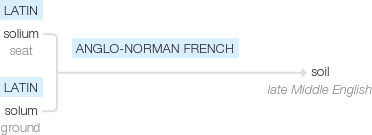Soil
late Middle English: from Anglo-Norman French, perhaps representing Latin solium ‘seat’, by association with solum ‘ground’.
wiktionary
From Middle English soile, soyle, sule(“ground, earth”), partly from Anglo-Norman soyl(“bottom, ground, pavement”), from Latin solium(“seat, chair; throne”), mistaken for Latin solum(“ground, foundation, earth, sole of the foot”); and partly from Old English sol(“mud, mire, wet sand”), from Proto-Germanic *sulą(“mud, spot”), from Proto-Indo-European *sūl-(“thick liquid”). Cognate with Middle Low German söle(“dirt, mud”), Middle Dutch sol(“dirt, filth”), Middle High German sol, söl(“dirt, mud, mire”), Danish søle(“mud, muck”). Compare French seuil(“level; threshold”) and sol(“soil, earth; ground”). See also sole, soal, solum.
From Middle English soilen, soulen, suylen(“to sully, make dirty”), partly from Old French soillier, souillier(“to soil, make dirty, wallow in mire”), from Old Frankish *sauljan, *sulljan(“to make dirty, soil”); partly from Old English solian, sylian(“to soil, make dirty”), from Proto-Germanic *sulwōną, *sulwijaną, *saulijaną(“to soil, make dirty”), from Proto-Indo-European *sūl-(“thick liquid”). Cognate with Old Frisian sulia(“to soil, mire”), Middle Dutch soluwen, seulewen(“to soil, besmirch”), Old High German solōn, bisulen(“to make dirty”), German suhlen(“to soil, make dirty”), Danish søle(“to make dirty, defile”), Swedish söla(“to soil, make dirty”), Gothic 𐌱𐌹𐍃𐌰𐌿𐌻𐌾𐌰𐌽( bisauljan, “to bemire”). Compare sully.
From Middle English soyl, from Old French soil, souil(“quagmire, marsh”), from Frankish *sōlja, *saulja(“mire, miry place, wallow”), from Proto-Germanic *saulijō(“mud, puddle, feces”), from Proto-Indo-European *sūl-(“thick liquid”). Cognate with Old English syle, sylu, sylen(“miry place, wallow”), Old High German sol, gisol(“miry place”), German Suhle(“a wallow, mud pit, muddy pool”).
From Old French saoler, saouler(“to satiate”).
etymonline
soil (v.)
early 13c., "to defile or pollute with sin," from Old French soillier "to splatter with mud, to foul or make dirty," originally "to wallow" (12c., Modern French souillier), from souil "tub, wild boar's wallow, pigsty," which is from either Latin solium "tub for bathing; seat" (from PIE *sodio- "seat," from root *sed- "to sit") or Latin suculus "little pig," from sus "pig." Literal meaning "to make dirty, begrime" is attested from c. 1300 in English. Related: Soiled; soiling.
soil (n.1)
c. 1300, originally "land, area, place," from Anglo-French soil "piece of ground, place" (13c.), from a merger or confusion of Old French sol "bottom, ground, soil" (12c., from Latin solum "soil, ground;" see sole (n.1)), Old French soeul, sueil "threshold, area, place" (from Latin solium "seat," from PIE *sodio- "seat," from PIE root *sed- (1) "to sit"), and Old French soil, soille "a miry place," from soillier (see soil (v.)).
Meaning "place of one's nativity" is from c. 1400. Meaning "mould, earth, dirt" (especially that which plants grow in) is attested from mid-15c.
soil (n.2)
"filth, dirt, refuse matter, sewage, liquid likely to contain excrement," c. 1600, earlier "miry or muddy place" (early 15c.), from Old French soille "miry place," from soillier (v.) "to make dirty," and in part a native formation from soil (v.). This is the sense in archaic night-soil.
